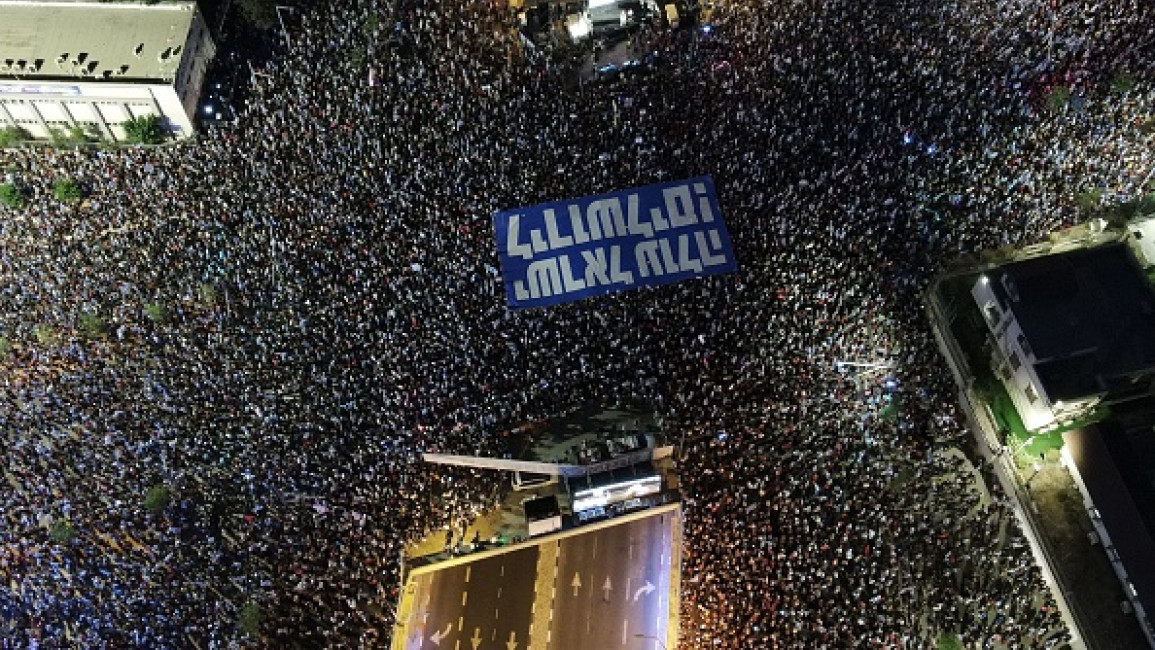Israelis intensify protests ahead of final vote on reform bill
Tens of thousands of Israeli protesters rallied in Tel Aviv and near parliament in Jerusalem on Saturday, intensifying action against a controversial judicial reform bill that faces a final vote early next week.
The judicial revamp, proposed by Prime Minister Benjamin Netanyahu's hard-right government, has split the nation and sparked one of the biggest protest movements in Israel's history.
In January, the government unveiled the plans to limit the Supreme Court's powers as part of the package of reforms, which opponents view as a threat to democracy.
Lawmakers on Monday are set to hold a final vote over the key "reasonability" clause through which judges can strike down government decisions.
Other proposed reforms include giving the government a greater say in the appointment of judges.
Protests have drawn support from across political and social strata, including both the left and the right, secular and religious groups, peace activists and military reservists, as well as blue-collar and tech workers.
On Saturday protests were also held in Beersheva, Herzliya and Kfar Saba, according to footage distributed by organisers.
In Tel Aviv, the country's commercial centre, tens of thousands rallied chanting pro-democracy slogans and beating drums their 29th consecutive weekly rally.
"Democracy or revolution! Respect existence or expect resistance!" chanted protesters, many wearing shirts with "Democracy" printed on them, an AFP correspondent reported.
"The government is not listening to us, it means it's the beginning of a new era, a bad era," protester Idit Dekel, 55, told AFP.
"For me it is catastrophic. It's the beginning of something we have never experienced before," added Dekel, a tech employee.
On Saturday evening, thousands of protesters also entered Jerusalem and began gathering near parliament and the Supreme Court.
They had arrived in Jerusalem after a multi-day march that began in Tel Aviv earlier this week.
"This government is an extreme, religious government, and hopefully we will take it down as quickly as possible," said Guy Maidan, who had participated in the march along with his family.
"Many of us will camp here until this vote is cancelled."
Carrying Israeli flags, water bottles and umbrellas against the scorching sun, the protesters had been marching earlier this week, taking mid-day and night-time breaks on their way to Jerusalem.
By evening they plan to camp near the Knesset as lawmakers begin a debate on the so-called "reasonability clause" of the reforms Sunday.
If approved in the final vote Monday, it would be the first major component of the proposed legal overhaul to become law.
Netanyahu's government, which includes extreme-right and ultra-Orthodox Jewish allies, plans to curb the court's powers granted under this clause, arguing that the changes are necessary to ensure a better balance of power.
Critics accuse Netanyahu, who is on trial on corruption charges he denies, of trying to use the reforms to quash possible judgements against him.
He rejects the accusation.
The "reasonability" clause was most recently cited by Israel's top court to force Netanyahu to remove a cabinet member over a previous tax evasion conviction.
Late on Friday, at least 1,142 air force reservists, including fighter pilots, threatened to suspend volunteer service if parliament passes the bill.
"We all share a responsibility to stop the deep division, polarisation and rift among the people," the reservists said in a declaration whose signatories included 235 fighter pilots, 173 drone operators, and 85 commando soldiers.
They called on the government to "arrive at a broad consensus, strengthen the trust of... the people in the judicial system and maintain its independence".
Any legislation carried out in an "unreasonable manner would erode my agreement to keep risking my life and would force me, with great sorrow, to suspend my voluntary reserve service," the signatories said.
The reforms have also drawn international criticism, including from US President Joe Biden.
"My recommendation to Israeli leaders is not to rush," Biden was quoted as saying by columnist Thomas Friedman in the New York Times earlier this week.
"I believe the best outcome is to continue to seek the broadest possible consensus here."
Late Thursday, Netanyahu said he was "still trying to reach an agreement with the opposition", mainly on the "reasonability" clause.



